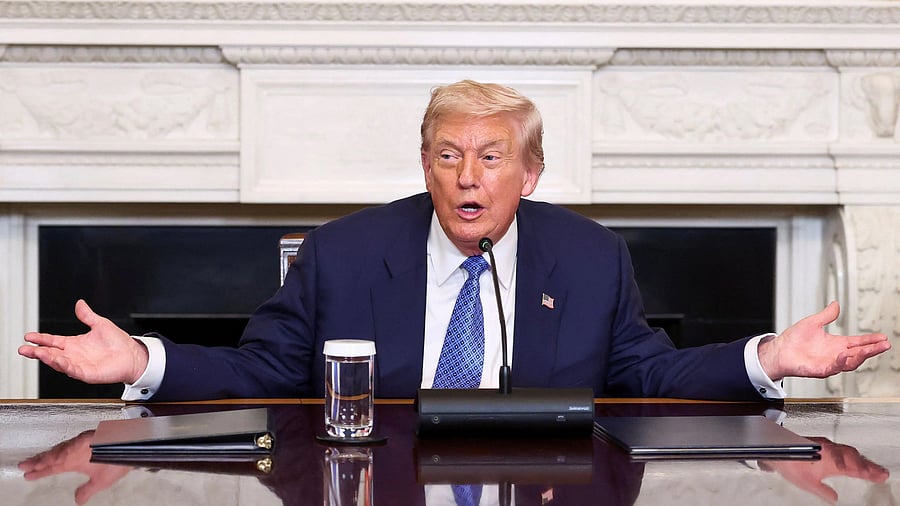
US President Donald Trump
Credit: Reuters Photo
Humans have been known to go to strange lengths in the name of legacy. Almost 80 years old, having shown signs of both physical and mental frailty, United States President Donald Trump seems to be coming to terms with his mortality. As someone with a very questionable public record in the context of his well-documented personal, professional, and social choices, he seems to have settled upon bagging the Nobel Peace Prize to whitewash his legacy with the determination and principles of a real-estate dealmaker.
Similarities abound with Alfred Nobel, who founded the prize, to leave behind a better legacy than the one he was most infamous for — the invention of dynamite in 1897, the commercial explosive later giving form to military variants.
India-US ties in a quandary
After more than a decade of concerted effort from both sides in strengthening India-US ties, New Delhi is left stunned by the vulgar display of unilateral power-projection by Trump.
Trump has been voicing his discomfort with the US’ trade deficit with India since the start of his second term in January. Were the embarrassing images of Indian citizens (accused of being illegal immigrants) handcuffed and deported back from the US soon after, a sign of things to come? Yet, his imposition of a 25% ‘reciprocal’ tariff on trade from India at the end of July – while bilateral trade agreement negotiations are in progress – came as a rude shock to many on the Indian side.
Next, he labels India (alongside Russia) as “dead economies”. Then he imposes a secondary tariff of another 25% on Indian goods as punishment for India’s substantial crude oil purchase from Russia, alongside the damning accusation: “They don’t care how many people in Ukraine are being killed by the Russian War Machine”.
Without expanding upon the history of the ‘American War Machine’ that has long orchestrated global wars, or the US’ failures in keeping at bay Russia’s ensuing concerns over NATO’s expansion in Europe, or Trump’s efforts to throw Ukraine’s president and populace under the bus a few months ago while praising a “savvy” and “genius” Vladimir Putin, or the fact that almost 60,000 civilians have been killed in the ongoing genocide in Gaza with the US’ financial and military support for Israel … it must be said that the US president is being irresponsible and unreasonable in his stance towards India.
While most observers across the world see Trump’s latest meltdown as a serious dent in the otherwise promising India-US relationship, one that the US sceptics and navel-gazing nationalists in India will have strong reactions to, India needs to look beyond the ignominy in this attack at this critical stage for a deeply disrupted international order.
India needs a different key to this lock
Having finished six months in what has been a tumultuous phase in US politics, and global affairs, the peace-deal-touting revisionist in Trump stands frustrated. He has failed to bring to halt the two wars that he campaigned against — and promised to end on his first day in office — in Ukraine and Gaza.
In addition, while he claims to be averaging ‘one ceasefire a month’ in his efforts to bring an end to conflicts across the world, he has seen incessant pushback from India on his desire to be credited with putting an end to the intense military exchange between nuclear-neighbours India and Pakistan in May.
Add to these a growing disenchantment in the US with the Trump administration’s handling of its global tariff policy, domestic economic measures, and the Jeffrey Epstein files — setting up a perfect reaction storm from a president known to prioritise his public popularity and take knee-jerk decisions.
In response, rather than take the reckless-bullying head-on in a confrontation, India — perceived to be ‘lacking leverage’ against the US to be able to retaliate materially against these impositions — should look to use ‘the cards’ it has, and instead help Trump achieve the fundamental goals driving this behaviour.
Besides keeping its diplomatic channels open to communication with the US, India must try to work with its longstanding partner, Russia, to put an end to the war in Ukraine.
Indian NSA Ajit Doval’s presence in Moscow on the back of Trump’s impulsive manoeuvres, looking to firm up Putin’s upcoming visit to India, alongside Russia’s continued engagement with the US, suggests there is room to seek common ground between all parties.
Conclusion
Trump is highly sensitive to, and is acting upon, prevailing ‘Western’ concerns over an increasingly assertive BRICS, particularly on issues related to trade and global governance. With Russia having rejected Trump’s peace gestures repeatedly in the past, and China having responded aggressively (from a position of strength) to the US’ tariff threats, Brazil, India, and South Africa remain the only pillars exposed. Trump has already picked a bone with South Africa over their land laws early in his term, and has since gone on a tirade against Brazil’s Left-leaning government with political accusations and 50% tariffs. It’s India’s turn now, and there is ample opportunity in this phase for a country that presents the world’s most sizable population, second-biggest digital user base, fourth-largest economy, and fourth-strongest defence base, to chart a course with strategic tact and confidence.
Rahul Batra works on technology and geopolitics.
Disclaimer: The views expressed above are the author's own. They do not necessarily reflect the views of DH.